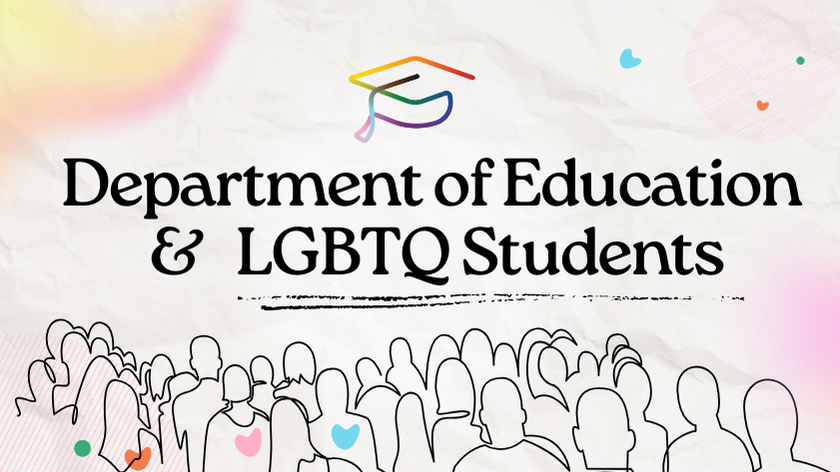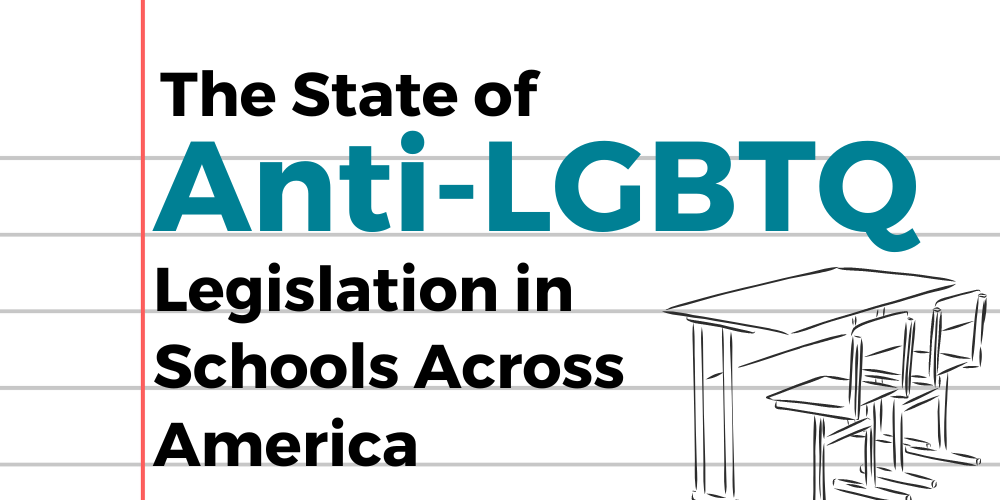Navigating Anti-LGBTQ+ Environments as a Higher Education Professional

Last updated March 2025
In 2023, the U.S. Supreme Court issued decisions that gutted protections for students of color in colleges and universities, terminated an attempt at debt alleviation for people currently repaying student loans, and created a precedent for legal challenges by private businesses against LGBTQ+ people. More than 16 states passed laws placing restrictions on LGBTQ+ students’ rights in schools, colleges, and universities.
Beyond the effects on LGBTQ+ students’ safety and success, this distressing reversal of programming in education profoundly affects LGBTQ+ and allied higher education professionals who are striving for equality at their schools.
The Unknown
Anti-LGBTQ+, and other hate legislation has left educators and administrators in a state of uncertainty about the future. Despite the unknowns, there are still steps higher education professionals can take to be proactive.
How to Support Diversity and Inclusion in Uncertain Times
1. Stay informed about changing educational policies and practices.- Diversify your information sources; think beyond higher education publications and consider subscribing to Out Magazine, Them.us, NBC Out, and more.
- Keep track of changes in the law. The Chronicle of Higher Education has a Legislation Tracker.
- Attend meetings of your institution’s faculty senate and board of trustees or regents. These meetings are often open to the university community and offer insight into how leaders navigate the current landscape.
In a school or state that restricts LGBTQ+ services?
- You are not alone. Some local and state laws directly prohibit schools from offering classes and services with LGBTQ+ content; however, the national anti-LGBTQ+ climate is having a chilling effect on LGBTQ+ student support even in states without restrictive legislation. Under pressure from state legislatures and university leaders, faculty and staff have been strongly encouraged to change the names of classes and academic departments. Some staff have found themselves with changed titles and job descriptions or have felt their jobs are in danger of elimination. Seeing anti-LGBTQ+ sentiment impact our workplaces and professional communities is frightening and disillusioning. However, there are still ways you can support students and create an affirming community on campus.
- Explore the support and resources offered by national organizations. Organizations like Point Foundation aren’t bound by the state laws affecting educational institutions and will continue to generate resources, provide funding, and offer support for students, faculty, and staff. Are you in need of informational pamphlets, but your school can’t print them out? Direct students or staff to national websites. Seeking funding for LGBTQ+ student success? Find organizations that provide scholarships or grants to support their success.
- Support student communities, formal and informal. Whether your students are in an official LGBTQ+ student org or an unofficial or off-campus organization, they need your help! Simply letting students know that you are an ally or a member of the LGBTQ+ community will strengthen their network of safe touchpoints on campus. It is also important to know your school’s policies to ensure that you and your students are not penalized for discussing LGBTQ+ issues on campus. Make sure to discuss relevant policies with students who seek your advice.
Not in a state that restricts LGBTQ+ services?
- Make your LGBTQ+ community accessible to students outside of your school or state. Whether you offer campus resource guides for students, teaching practices for educators and administrators, or online meetings and events, broadcast that material on your website, your social media, and elsewhere. This will help people find help and information if LGBTQ+ resources are cut off at their institutions.
- Educate your colleagues about the issues. Consider sharing research and best practices for supporting LGBTQ+ students (such as these from Point) at conferences and in forums for higher ed staff and faculty. While your experience and your institutional context are local, your insight is relevant to people across the nation! Sharing your learnings and experiences will help to ensure the continued flow of information despite censorship at the state or institutional level.
- REMINDER: Even if titles have changed and programs have disappeared, the people who are invested in creating a welcoming learning environment where students feel like they belong are still there.
3. Build coalitions.
- Focus on shared commitment to student well-being to strengthen relationships with your coworkers. Define your shared goals for your students, focusing on outcomes and your vision of student success rather than policy. By collaborating with your peers, even if you don’t see eye-to-eye, you can build a coalition of change and growth within your department or school.
- Reach out to local faculty organizations such as the American Association of University Professors (AAUP). You can find your local Chapter on AAUP’s website.
- In thinking about reaching new faculty and possible allies find places where your peers discuss common causes like listservs, Facebook groups, etc.
- Mentor and build leaders from within these coalitions who can get into change-making positions.
- Reach out to local faculty organizations such as the American Association of University Professors (AAUP). You can find your local Chapter on AAUP’s website.
- With an ever-changing landscape, too much emphasis cannot be placed on connecting with professional organizations committed to the success of disenfranchised students in higher education. Groups to consider joining include:
Ways to Support Your Students
Mental Health
LGBTQ+ students reported lower self-esteem and sense of belonging than non-LGBTQ+ peers, even before the recent surge in anti-LGBTQ+ attacks on educational institutions.
In 2021, 67% of LGBTQ+ students surveyed by the Proud & Thriving Project felt lonely or isolated, and 55% expressed feelings of hopelessness, compared to 49% and 35% of non-LGBTQ+ students, respectively. In four-year institutions, students are twice as likely to report unfair treatment from administrators and staff, and three times more likely to experience poor mental health, according to our research with the Williams Institute.
Mental health issues can be exacerbated by the elimination or contraction of support services on campus like LGBTQ+ centers and classes.
“We’ve seen it in the news and we’ve experienced it in our reality every day: attacks against our community have gone from online spaces and now we’re seeing it more than ever in legislation in physical confrontations, and verbal confrontation and even just attacks against companies who joining celebrating pride, for example. That is just a call for people to take action and stand up.” - Jose, Point Alum
Responding to Microaggressions in the Classroom
You may experience an increase of micro- and macroaggressions from students, staff or administrators on campus in response to recent legislation and media coverage. In these cases, it’s important to use intervention strategies that bring students into conversation and challenge their ideas.
The following resources can help facilitate these conversations:
- Responding to Microaggressions in the Classroom worksheet - Texas Tech.
- Responding to Microaggressions in the Classroom: Taking ACTION - Faculty Focus.
Reflect
While navigating this difficult time, remember to create space for thoughtful reflection. Ask yourself:
- What does it mean to you to be a good educator and colleague?
- What action are you comfortable taking? What factors into your comfort levels?
- How do your priorities have to change? What does that look like in your position?
- How can you communicate your support to students?
Related Posts
October 22, 2024, Point Foundation

LGBTQ+ Students In Higher Education: Challenges And Support
DOWNLOAD RESOURCE DOWNLOAD ONE PAGER Updated March 2025 LGBTQ+ students in higher education face...
February 13, 2025, Point Foundation

Why is the Department of Education Vital to All Postsecondary Students?
In recent weeks, news has been reported of the possibility of cuts to the Department of Education...
July 14, 2023, Point Foundation

2023 Anti-LGBTQ+ Laws in the Classroom
In 2023, more than 20 states passed anti-LGBTQ+ legislation according to the American Civil...